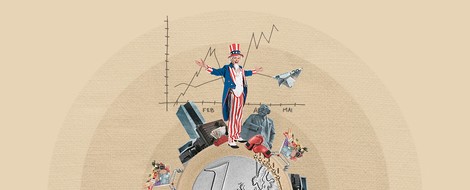sharing is caring
ist wirklich so!
Vielen Dank fürs Teilen!
Kluge Köpfe filtern für dich relevante Beiträge aus dem Netz.
Entdecke handverlesene Artikel, Videos und Audios zu deinen Themen.
Nach der Wirtschafts- und Finanzkirse der Jahre 2008/09 ist immer wieder beklagt worden, dass die Ökonomen in den Wirtschaftsministerien und Zentralbanken mit immer denselben Rezepten auf jedes neue Problem reagieren – und nicht realisiert haben, dass die Wirtschaft und die Gesellschaft sich gewandelt haben.
In der gegenwärtigen Krise versuchen Staat und Notenbanken, tatsächlich andere Lösungen zu finden. Der tiefe Einbruch des Vorjahres scheint keine dauerhaften Spuren zu hinterlassen. Die lange Zeit belächelte Modern Monetary Theory ist in der Praxis angekommen. Der Staat rettet nun nicht mehr von oben nach unten (indem er Banken und Industrie mit Geld versorgt), sondern umgekehrt (indem er den Bürgern die Löhne weiter zahlt und dadurch ein Übergreifen der Krise verhindert).
Der Staat kehrt als zentraler wirtschaftlicher Akteur zurück. Es ist ein direkt investierender, regelnder und umverteilender Staat. Vor zehn Jahren wäre dies noch undenkbar gewesen, heute scheint es alternativlos.
Ökonomen leben in ausgesprochen spannenden Zeiten.
Da sich der Text hinter der Bloomberg-Firewall befindet, hier die entscheidenden Passagen:
Once ideas about how to manage the economy become entrenched, it can take generations to dislodge them. Something big usually has to happen to jolt policy onto a different track. Something like Covid-19.
In 2020, when the pandemic hit and economies around the world went into lockdown, policymakers effectively short-circuited the business cycle without thinking twice. In the U.S. in particular, a blitz of public spending pulled the economy out of the deepest slump on record—faster than almost anyone expected—and put it on the verge of a boom. The result could be a tectonic transformation of economic theory and practice.
The Great Recession that followed the crash of 2008 had already triggered a rethink. But the overall approach—the framework in place since President Ronald Reagan and Federal Reserve Chair Paul Volcker steered U.S. economic policy in the 1980s—emerged relatively intact. Roughly speaking, that approach placed a priority on curbing inflation and managing the pace of economic growth by adjusting the cost of private borrowing rather than by spending public money.
The pandemic cast those conventions aside around the world. In the new economics, fiscal policy took over from monetary policy. Governments channeled cash directly to households and businesses and ran up record budget deficits. Central banks played a secondary and supportive role—buying up the ballooning government debt and other assets, keeping borrowing costs low, and insisting that this was no time to worry about inflation. Policymakers also started looking beyond aggregate metrics to data that show how income and jobs are distributed and who needs the most help.
...
In 2020 the doctrine of austerity went into rapid retreat all over the world. The IMF noted concerns about rising debt levels but said a bigger risk was that governments would curtail their spending too soon. In 2008, U.S. policymakers were overly selective about who should and shouldn’t receive aid and erred on the side of doing too little ...
Even before Covid-19, the plight of low-paid workers was increasingly a focus of economic policy. The depth of the Great Recession and the slow recovery put issues such as economic inequality and racial justice in the spotlight. Wealth and income gaps, especially in the U.S., but in other developed countries, too, have been widening since the 1980s as government intervention in the economy was supplanted by an overreliance on the free market.
Direct payments to low-income households could be a powerful new tool to protect people at the bottom of the economic ladder from the wealth destruction that always accompanies downturns.
THE PROMINENCE of such transfer payments during the pandemic highlights another big shift in economics: the handover of power from monetary to fiscal policy and thereceding role of the inflation-fighting central bank.
...
In a March report, the United Nations Conference on Trade and Development listed some of the ideas that dominated global economic policymaking before the pandemic—“austerity, inflation targeting, trade and investment liberalization, innovative finance, and labor market flexibility”—and described some of their negative effects: “This path led to a world of growing economic inequalities, arrested development, financialfragility, and unsustainable use of natural resources before the pandemic hit.”

Quelle: Matthew Boesler EN | Artikel kostenpflichtig blinks.bloomberg.com
Bleib immer informiert! Hier gibt's den Kanal Volk und Wirtschaft als Newsletter.
Einfach die Hörempfehlungen unserer Kurator'innen als Feed in deinem Podcatcher abonnieren. Fertig ist das Ohrenglück!


Öffne deinen Podcast Feed in AntennaPod:
Wenn alles geklappt hat,
kannst du das Fenster schließen.

Öffne deinen Podcast Feed in Apple Podcasts:
Wenn alles geklappt hat,
kannst du das Fenster schließen.

Öffne deinen Podcast Feed in Downcast:
Wenn alles geklappt hat,
kannst du das Fenster schließen.

Öffne deinen Podcast Feed in Instacast:
Wenn alles geklappt hat,
kannst du das Fenster schließen.

Öffne deinen Podcast Feed in Apple Podcasts:
Wenn alles geklappt hat,
kannst du das Fenster schließen.

Öffne deinen Podcast Feed in Podgrasp:
Wenn alles geklappt hat,
kannst du das Fenster schließen.

Bitte kopiere die URL und füge sie in deine
Podcast- oder RSS-APP ein.
Wenn du fertig bist,
kannst du das Fenster schließen.

Öffne deinen Podcast Feed in gpodder.net:
Wenn alles geklappt hat,
kannst du das Fenster schließen.

Öffne deinen Podcast Feed in Pocket Casts:
Wenn alles geklappt hat,
kannst du das Fenster schließen.